How to remove the SearchEmpire application from your computer
Mac VirusAlso Known As: Ads by SearchEmpire
Get free scan and check if your device is infected.
Remove it nowTo use full-featured product, you have to purchase a license for Combo Cleaner. Seven days free trial available. Combo Cleaner is owned and operated by RCS LT, the parent company of PCRisk.com.
What kind of application is SearchEmpire?
While analyzing newly submitted samples on VirusTotal, our researchers recently encountered the SearchEmpire application. After thoroughly examining the software, we have confirmed that SearchEmpire operates as adware. Its primary function is to display advertisements and may possess other potentially harmful functionalities.
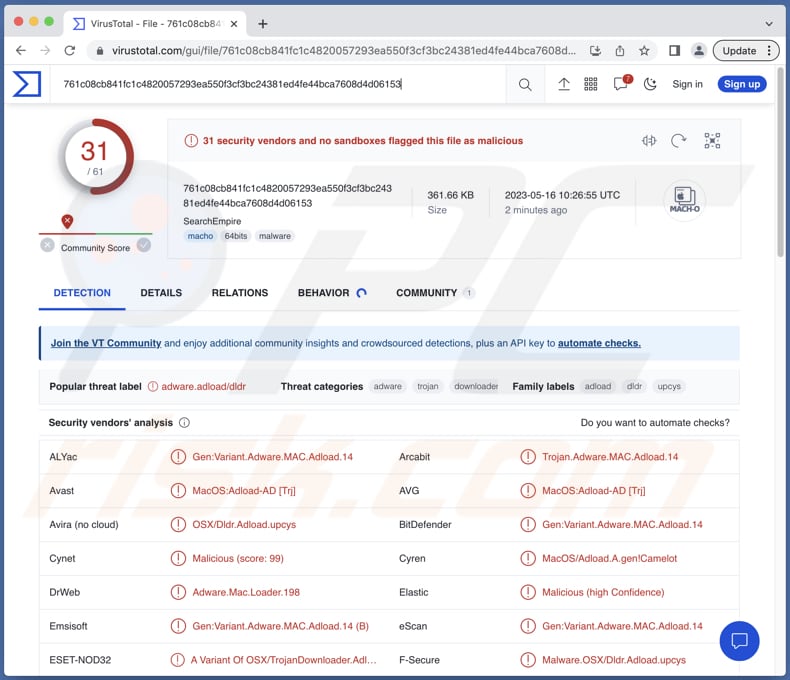
SearchEmpire adware in detail
The specific ads displayed by adware like SearchEmpire can vary. Adware typically generates different types of advertisements, including pop-ups, banners, and in-text ads. These ads can promote various products, services, or potentially unwanted programs.
The ads shown by SearchEmpire have the potential to redirect users to sponsored websites, online stores, phishing sites, or other malicious destinations. The primary objective is likely to generate revenue for the creators of SearchEmpire through means such as clicks, ad impressions, or participation in affiliate marketing programs.
It is important to note that adware like SearchEmpire can also have other harmful capabilities, such as collecting various data (e.g., credit card details, passwords, browsing history, and more) and causing system slowdowns. It is generally recommended to remove adware from your device to maintain a secure and efficient computing experience.
| Name | Ads by SearchEmpire |
| Threat Type | Adware, Mac malware, Mac virus |
| Detection Names | Avast (MacOS:Adload-AD [Trj]), Combo Cleaner (Gen:Variant.Adware.MAC.Adload.14), ESET-NOD32 (A Variant Of OSX/TrojanDownloader.Adload.AD), Kaspersky (Not-a-virus:HEUR:AdWare.OSX.Cimpli.l), Full List (VirusTotal) |
| Additional Information | This application belongs to Adload malware family. |
| Symptoms | Your Mac becomes slower than normal, you see unwanted pop-up ads, you are redirected to dubious websites. |
| Distribution methods | Deceptive pop-up ads, free software installers (bundling), torrent file downloads. |
| Damage | Internet browser tracking (potential privacy issues), display of unwanted ads, redirects to dubious websites, loss of private information. |
| Malware Removal (Windows) |
To eliminate possible malware infections, scan your computer with legitimate antivirus software. Our security researchers recommend using Combo Cleaner. Download Combo CleanerTo use full-featured product, you have to purchase a license for Combo Cleaner. 7 days free trial available. Combo Cleaner is owned and operated by RCS LT, the parent company of PCRisk.com. |
More about adware
Software like SearchEmpire can be designed to hijack a web browser. Browser hijacking is a common behavior exhibited by certain types of adware. When adware hijacks a browser, it can modify the browser's settings without the user's consent. It can include changing the default search engine, homepage, or new tab page and adding unwanted extensions or toolbars.
Examples of apps that function like SearchEmpire are EliteMaximus, ViewpointTools, and StyleHill.
How did SearchEmpire install on my computer?
Users can unintentionally install adware through various means. These include downloading freeware or shareware that comes bundled with adware, falling for fake software update prompts that contain adware, visiting malicious websites or clicking on malicious ads, downloading files from Peer-to-Peer networks that may contain adware, and being tricked by social engineering tactics into downloading and installing adware.
How to avoid installation of unwanted applications?
Be cautious of freeware or shareware that may come bundled with adware. Read user reviews and check for any signs of bundled software during installations. Avoid clicking on ads that appear too good to be true or use deceptive tactics to attract clicks.
Only download and install extensions from trusted sources, such as official browser stores and pages. Always verify the legitimacy of the download source before proceeding. If your computer is already infected with SearchEmpire, we recommend running a scan with Combo Cleaner Antivirus for Windows to automatically eliminate this adware.
Files related to the SearchEmpire adware that need to be removed:
- ~/Library/Application Support/com.SearchEmpire/SearchEmpire
- ~/Library/Application Support/com.SearchEmpireDaemon/SearchEmpire
- ~/Library/LaunchAgents/com.SearchEmpire.plist
- ~/Library/LaunchDaemons/com.SearchEmpireDaemon.plist
IMPORTANT NOTE! Rogue setups/apps that promote the SearchEmpire adware are designed to create a new device profile. Therefore, before taking any further removal steps, perform these actions:
1) Click the "Preferences" icon in the menu bar (Dock) and select "Profiles".
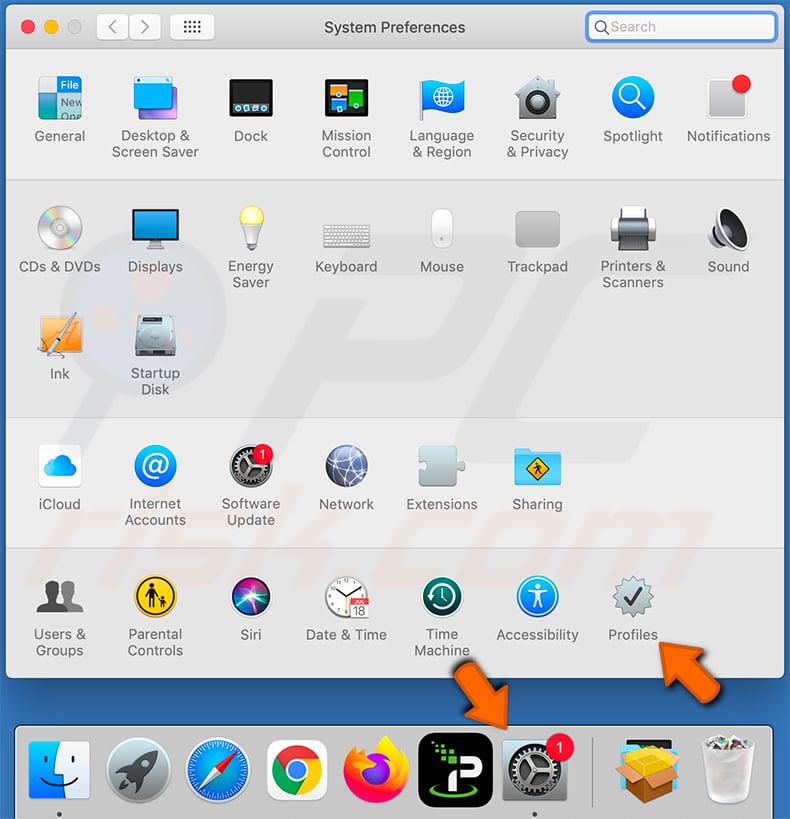
2) Locate all suspicious profiles and delete them.
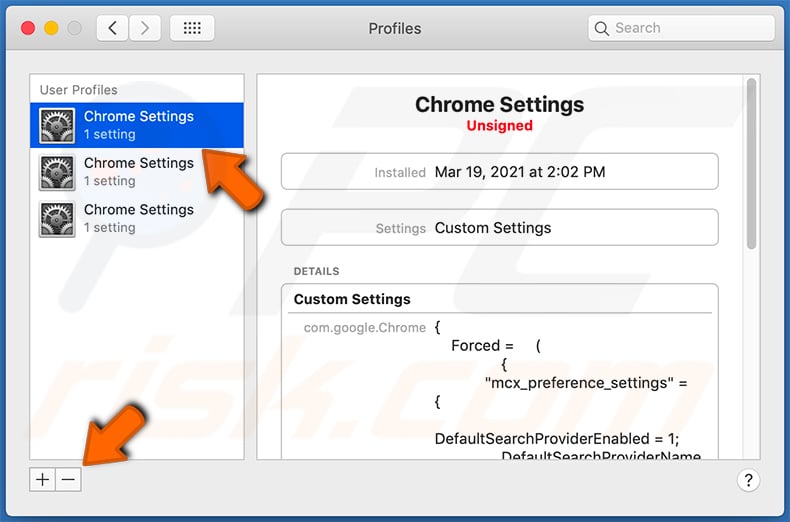
3) Perform a full system scan with Combo Cleaner anti-virus suite.
After performing these actions, you can proceed with further removal steps for this adware/browser hijacker.
Instant automatic malware removal:
Manual threat removal might be a lengthy and complicated process that requires advanced IT skills. Combo Cleaner is a professional automatic malware removal tool that is recommended to get rid of malware. Download it by clicking the button below:
DOWNLOAD Combo CleanerBy downloading any software listed on this website you agree to our Privacy Policy and Terms of Use. To use full-featured product, you have to purchase a license for Combo Cleaner. 7 days free trial available. Combo Cleaner is owned and operated by RCS LT, the parent company of PCRisk.com.
Quick menu:
- What is SearchEmpire?
- STEP 1. Remove SearchEmpire related files and folders from OSX.
- STEP 2. Remove SearchEmpire ads from Safari.
- STEP 3. Remove SearchEmpire adware from Google Chrome.
- STEP 4. Remove SearchEmpire ads from Mozilla Firefox.
Video showing how to remove SearchEmpire adware using Combo Cleaner:
SearchEmpire adware removal:
Remove SearchEmpire-related potentially unwanted applications from your "Applications" folder:
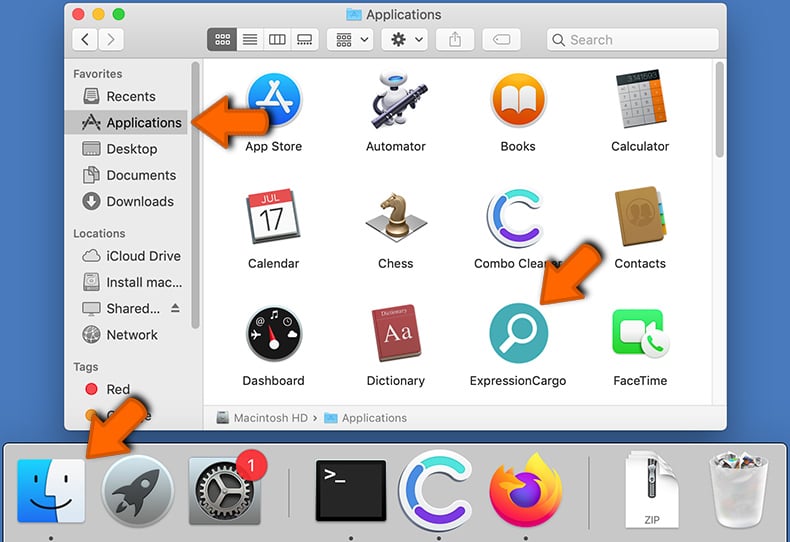
Click the Finder icon. In the Finder window, select "Applications". In the applications folder, look for "MPlayerX", "NicePlayer", or other suspicious applications and drag them to the Trash. After removing the potentially unwanted application(s) that cause online ads, scan your Mac for any remaining unwanted components.
DOWNLOAD remover for malware infections
Combo Cleaner checks if your computer is infected with malware. To use full-featured product, you have to purchase a license for Combo Cleaner. 7 days free trial available. Combo Cleaner is owned and operated by RCS LT, the parent company of PCRisk.com.
Remove adware-related files and folders
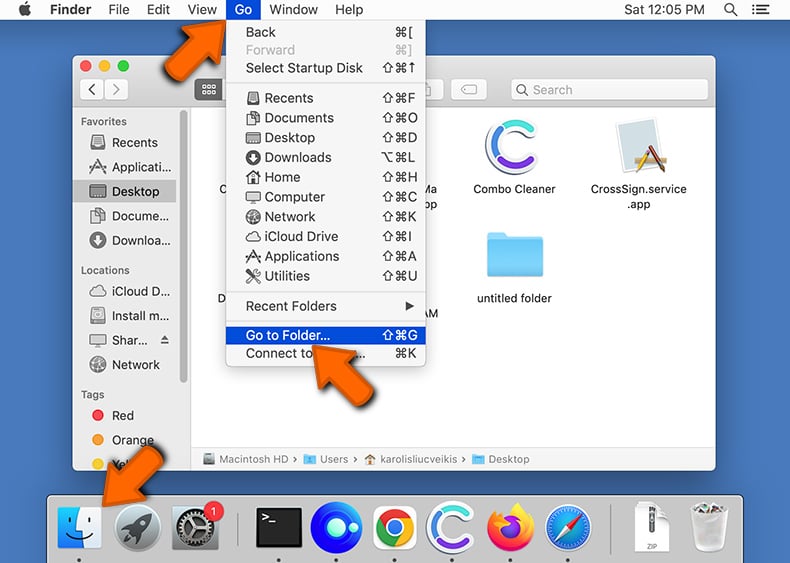
Click the Finder icon, from the menu bar. Choose Go, and click Go to Folder...
 Check for adware generated files in the /Library/LaunchAgents/ folder:
Check for adware generated files in the /Library/LaunchAgents/ folder:
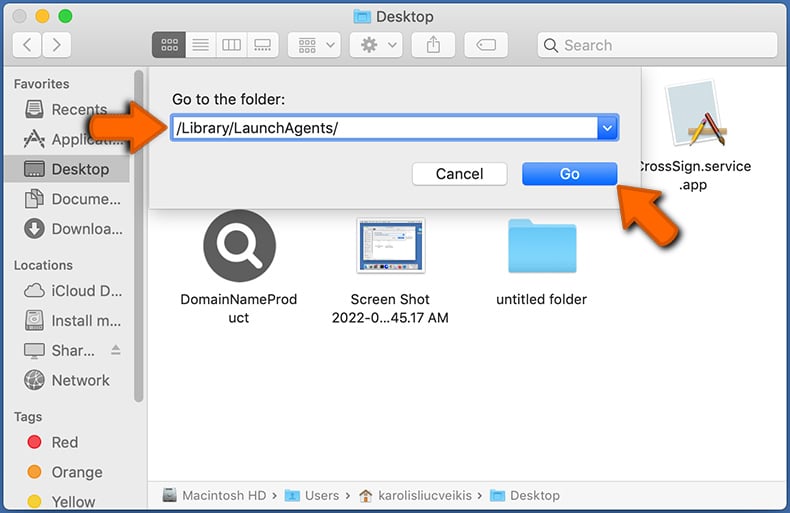
In the Go to Folder... bar, type: /Library/LaunchAgents/
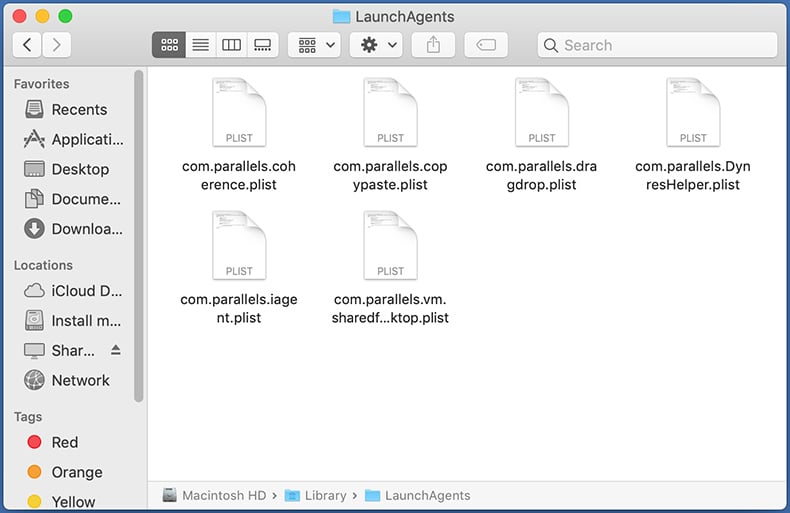
In the "LaunchAgents" folder, look for any recently-added suspicious files and move them to the Trash. Examples of files generated by adware - "installmac.AppRemoval.plist", "myppes.download.plist", "mykotlerino.ltvbit.plist", "kuklorest.update.plist", etc. Adware commonly installs several files with the exact same string.
 Check for adware generated files in the ~/Library/Application Support/ folder:
Check for adware generated files in the ~/Library/Application Support/ folder:
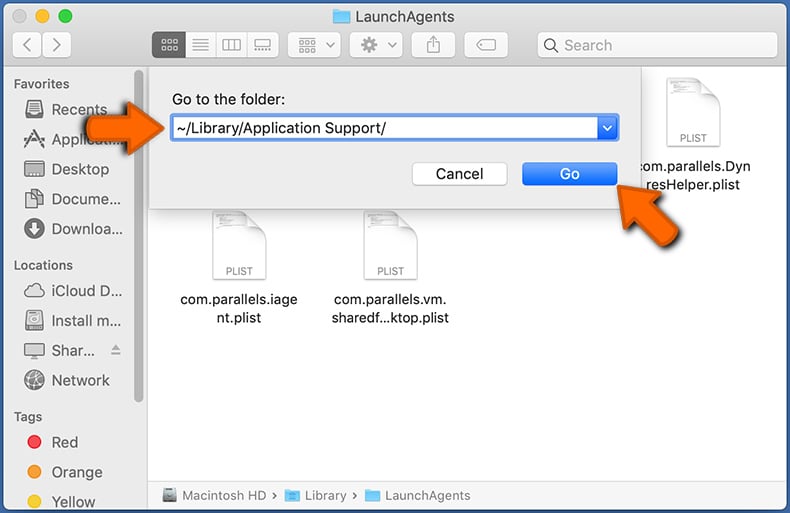
In the Go to Folder... bar, type: ~/Library/Application Support/
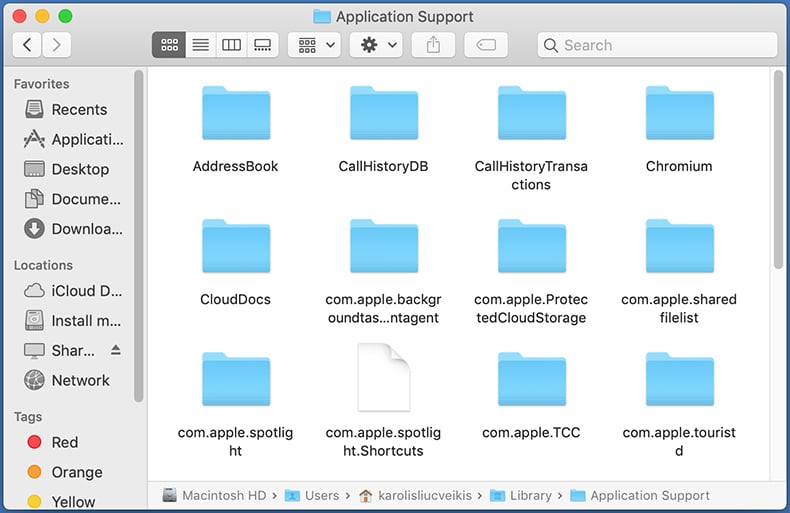
In the "Application Support" folder, look for any recently-added suspicious folders. For example, "MplayerX" or "NicePlayer", and move these folders to the Trash.
 Check for adware generated files in the ~/Library/LaunchAgents/ folder:
Check for adware generated files in the ~/Library/LaunchAgents/ folder:
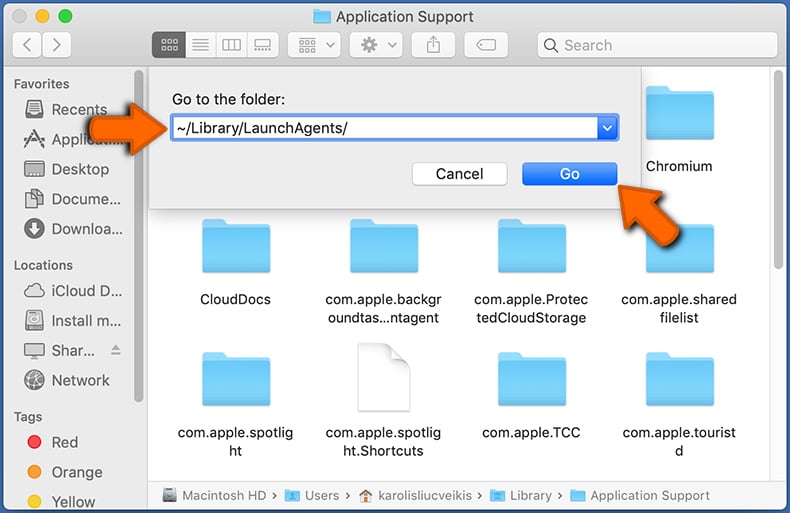
In the Go to Folder... bar, type: ~/Library/LaunchAgents/
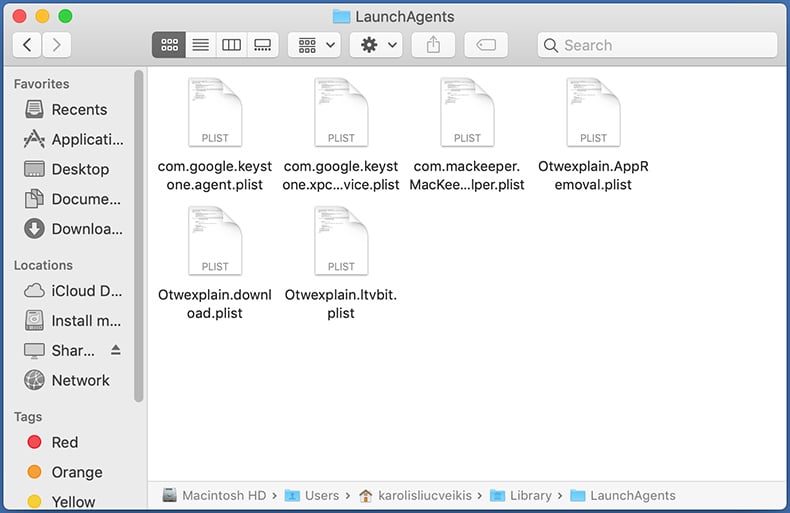
In the "LaunchAgents" folder, look for any recently-added suspicious files and move them to the Trash. Examples of files generated by adware - "installmac.AppRemoval.plist", "myppes.download.plist", "mykotlerino.ltvbit.plist", "kuklorest.update.plist", etc. Adware commonly installs several files with the exact same string.
 Check for adware generated files in the /Library/LaunchDaemons/ folder:
Check for adware generated files in the /Library/LaunchDaemons/ folder:
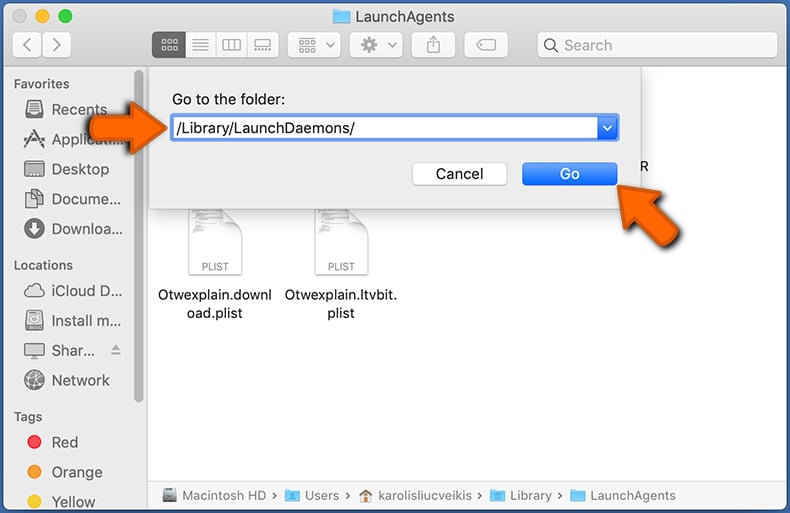
In the "Go to Folder..." bar, type: /Library/LaunchDaemons/
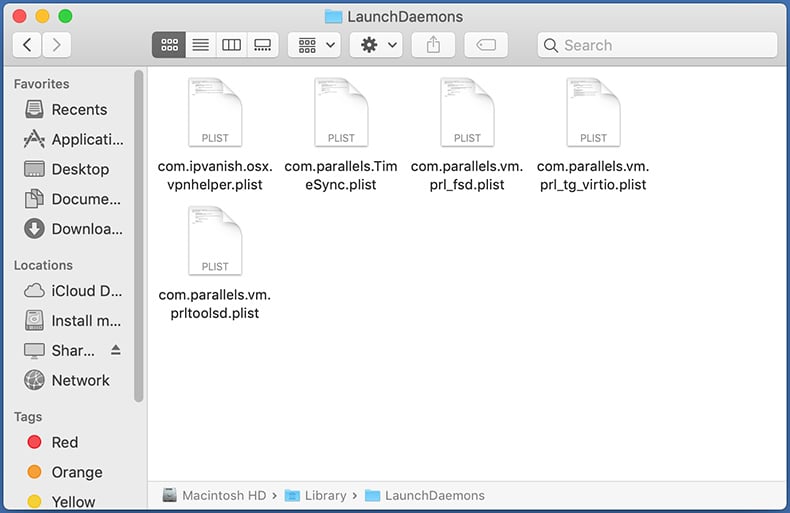
In the "LaunchDaemons" folder, look for recently-added suspicious files. For example "com.aoudad.net-preferences.plist", "com.myppes.net-preferences.plist", "com.kuklorest.net-preferences.plist", "com.avickUpd.plist", etc., and move them to the Trash.
 Scan your Mac with Combo Cleaner:
Scan your Mac with Combo Cleaner:
If you have followed all the steps correctly, your Mac should be clean of infections. To ensure your system is not infected, run a scan with Combo Cleaner Antivirus. Download it HERE. After downloading the file, double click combocleaner.dmg installer. In the opened window, drag and drop the Combo Cleaner icon on top of the Applications icon. Now open your launchpad and click on the Combo Cleaner icon. Wait until Combo Cleaner updates its virus definition database and click the "Start Combo Scan" button.
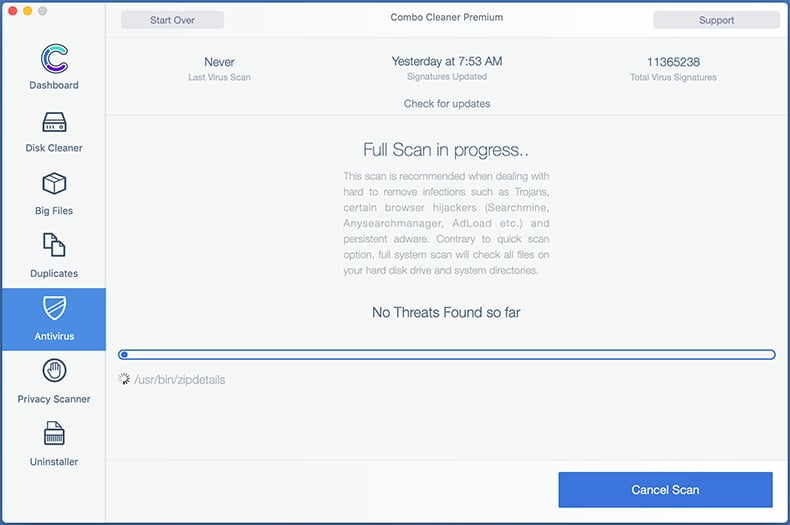
Combo Cleaner will scan your Mac for malware infections. If the antivirus scan displays "no threats found" - this means that you can continue with the removal guide; otherwise, it's recommended to remove any found infections before continuing.
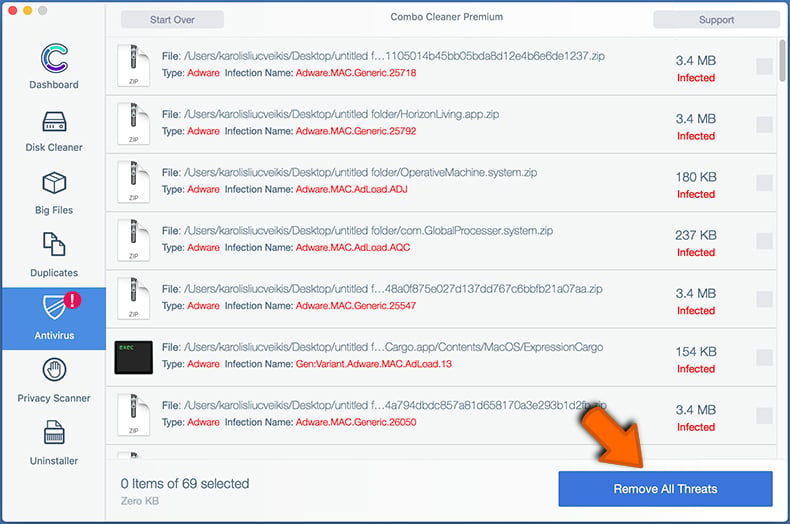
After removing files and folders generated by the adware, continue to remove rogue extensions from your Internet browsers.
Remove malicious extensions from Internet browsers
 Remove malicious Safari extensions:
Remove malicious Safari extensions:
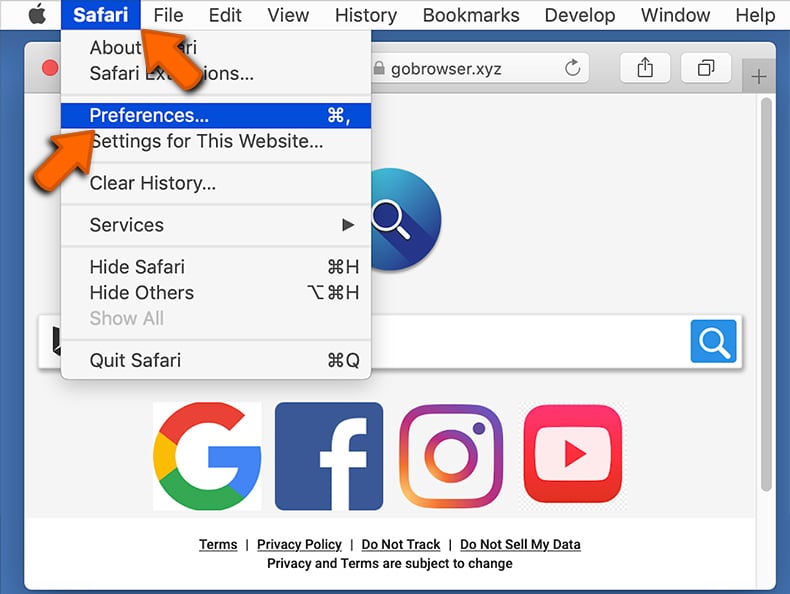
Open the Safari browser, from the menu bar, select "Safari" and click "Preferences...".
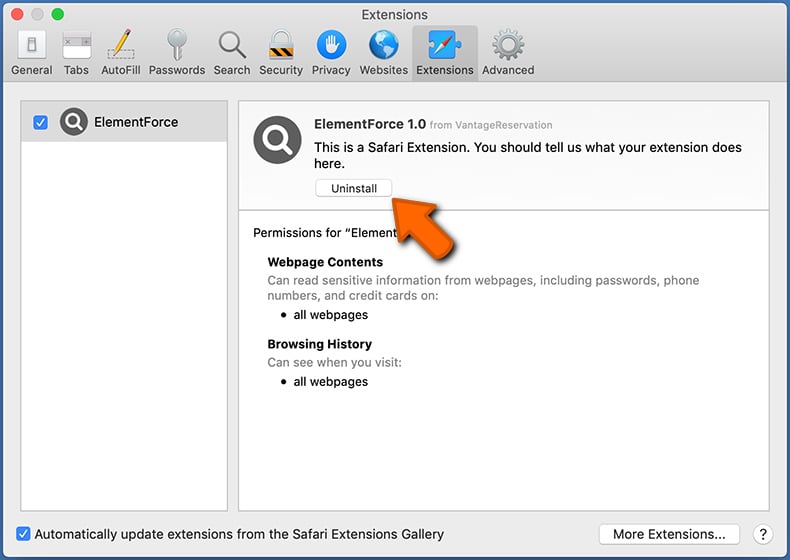
In the preferences window, select "Extensions" and look for any recently-installed suspicious extensions. When located, click the "Uninstall" button next to it/them. Note that you can safely uninstall all extensions from your Safari browser - none are crucial for regular browser operation.
- If you continue to have problems with browser redirects and unwanted advertisements - Reset Safari.
 Remove malicious extensions from Google Chrome:
Remove malicious extensions from Google Chrome:
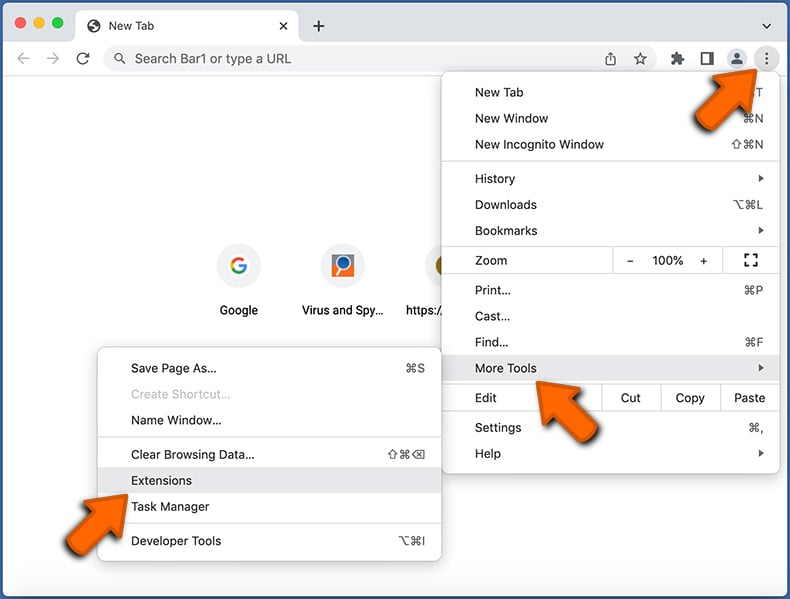
Click the Chrome menu icon ![]() (at the top right corner of Google Chrome), select "More Tools" and click "Extensions". Locate all recently-installed suspicious extensions, select these entries and click "Remove".
(at the top right corner of Google Chrome), select "More Tools" and click "Extensions". Locate all recently-installed suspicious extensions, select these entries and click "Remove".
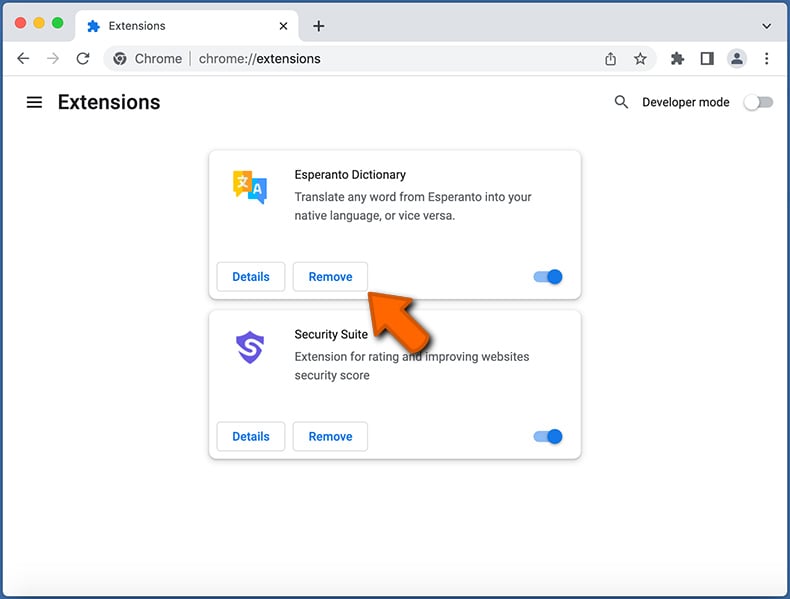
- If you continue to have problems with browser redirects and unwanted advertisements - Reset Google Chrome.
 Remove malicious extensions from Mozilla Firefox:
Remove malicious extensions from Mozilla Firefox:
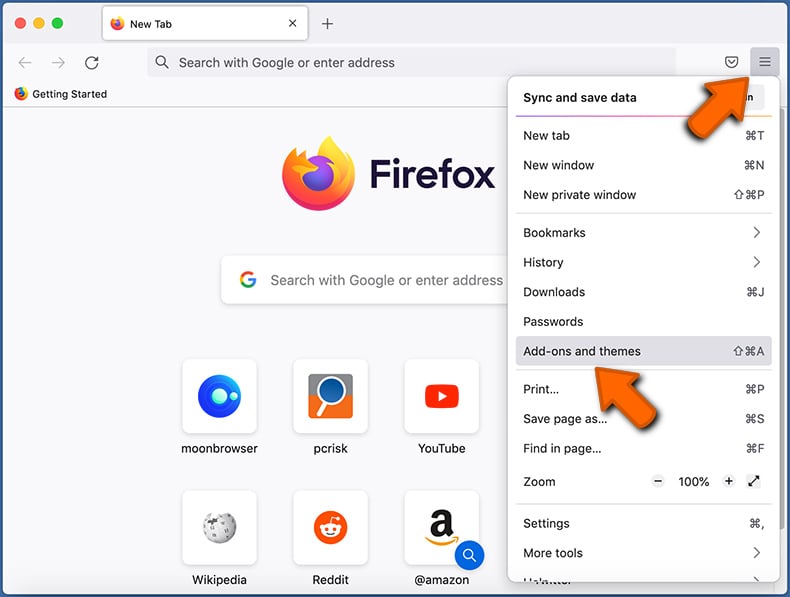
Click the Firefox menu ![]() (at the top right corner of the main window) and select "Add-ons and themes". Click "Extensions", in the opened window locate all recently-installed suspicious extensions, click on the three dots and then click "Remove".
(at the top right corner of the main window) and select "Add-ons and themes". Click "Extensions", in the opened window locate all recently-installed suspicious extensions, click on the three dots and then click "Remove".
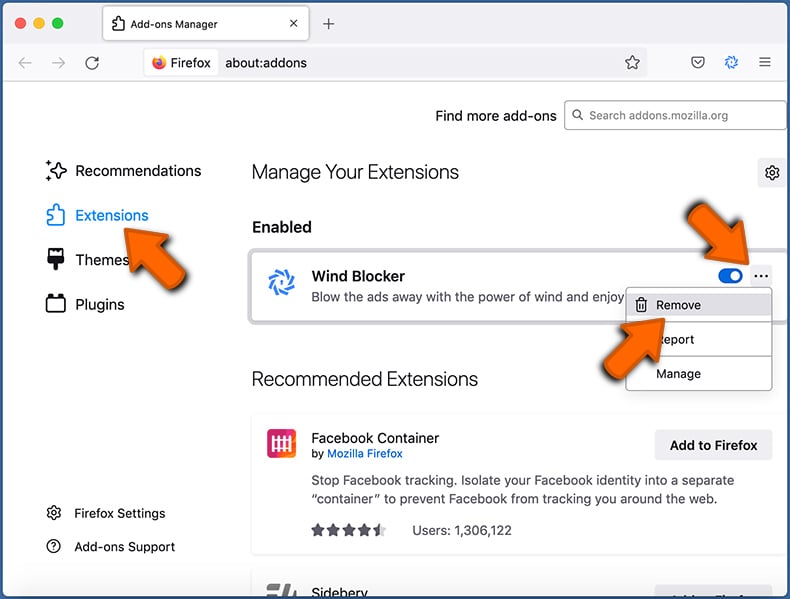
- If you continue to have problems with browser redirects and unwanted advertisements - Reset Mozilla Firefox.
Frequently Asked Questions (FAQ)
What harm can adware cause?
Adware can cause issues such as diminished browsing experience, sluggish system performance, intrusive advertising, browser hijacking, privacy issues, and potential identity theft.
What does adware do?
Adware refers to a specific kind of software that displays third-party advertisements on a user's computer. Its primary objective is to generate revenue for its developers through the delivery of these ads.
How do adware developers generate revenue?
Adware developers generate income by promoting a wide range of products, websites, or services. They often rely on affiliate programs as a common source of revenue. Through these programs, developers earn commissions or payments for driving traffic or generating sales for the affiliated products or services they promote.
Will Combo Cleaner remove SearchEmpire adware?
Manual removal may prove inadequate since certain files can remain concealed in the system, and adware components may continue to operate even after uninstalling the software. Combo Cleaner has the capability to scan your computer for adware-type applications and effectively eliminate them.
Share:

Tomas Meskauskas
Expert security researcher, professional malware analyst
I am passionate about computer security and technology. I have an experience of over 10 years working in various companies related to computer technical issue solving and Internet security. I have been working as an author and editor for pcrisk.com since 2010. Follow me on Twitter and LinkedIn to stay informed about the latest online security threats.
PCrisk security portal is brought by a company RCS LT.
Joined forces of security researchers help educate computer users about the latest online security threats. More information about the company RCS LT.
Our malware removal guides are free. However, if you want to support us you can send us a donation.
DonatePCrisk security portal is brought by a company RCS LT.
Joined forces of security researchers help educate computer users about the latest online security threats. More information about the company RCS LT.
Our malware removal guides are free. However, if you want to support us you can send us a donation.
Donate
▼ Show Discussion